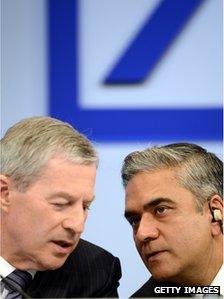Deutsche Bank books loss on legal risks and write-offs
- Published

Mr Fitschen (left) and Mr Jain took over joint control of the bank last year
Deutsche Bank has reported a surprise loss of 2.2bn euros ($2.9bn, £1.8bn) for the fourth quarter of 2012.
It came after Germany's biggest bank chose to set aside 1bn euros to cover potential litigation costs and to write off 1.9bn euros in dud investments.
The write-offs are the result of a restructuring that involves the hiving off of many non-essential businesses.
The bank may face lawsuits related to the manipulation of Libor, as well as other recent scandals.
Anshu Jain - the Indian investment banking head who took over last year as joint chief executive with the German Juergen Fitschen - said on Thursday that there had been informal discussions at Davos last week between Deutsche and other banks implicated in the Libor scandal over a possible industry-wide settlement of civil lawsuits against them.
So far, Barclays and UBS have reached settlements with regulators over the manipulation of Libor - a benchmark interest rate used to calculate payments under trillions of dollars of contracts - and many other banks, including Deutsche and RBS, are expected to follow.
By admitting their culpability to regulators, the banks open up the possibility of being sued by investors and borrowers whose interest income and payments were affected by the manipulation.
Positive market reaction
Deutsche has also been involved in two other recent scandals. In December, its offices were raided by German authorities seeking to prosecute some of the bank's employees, who they claim enabled tax evasion and money laundering by means of the European market for carbon emissions permits.
Separately, the bank has also been implicated in arranging financial transactions aimed at concealing losses made by Italy's oldest bank, Banca Mante dei Paschi di Siena.
Despite the fact that most analysts had been expecting Deutsche to report a modest profit for the quarter, financial markets reacted positively to the results, with the bank's share price rising 3.4% on the Frankfurt Stock Exchange.
Partly this was because markets took the view that the losses demonstrated that Deutsche's new management was tackling the bank's long-term problems head-on, and partly this was because the bank's underlying business position seemed to be improving, with revenues up 14% to 7.9bn euros.
Management had warned in December that it was likely to write off a significant portion of the 125bn euros in investments and businesses that the bank no longer deems of strategic importance and is therefore transferring to a new "non-core" division.
Many of the assets that the bank is dispensing with require large amounts of capital - the buffer of shareholder money that all banks are required by regulators to hold against potential future losses.
Deutsche hopes that its restructuring plan will help it achieve new, higher international capital requirements well ahead of schedule.
"We embarked upon the path of deliberate but sometimes uncomfortable change in order to deliver long-term, sustainable success for the bank," said the two chief executives in their results statement.
"Simultaneously, we set the bank on course for fundamental cultural change. This journey will take years, not months."